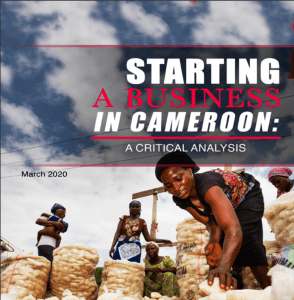For ten years, Cameroon has under its framework of the Cameroon Business Forum (CBF), undertaken several reforms to improve its business environment. The country aims to attract the local and foreign direct investment necessary for its economic growth, job creation, and living conditions of its populations. However, there are many bottlenecks to improving the business environment in Cameroon to promote business creation. The ranking in Doing Business is a serious reminder of those obstacles each year. Business creation in Cameroon is plagued by many obstacles that can be identified at various levels:
1. The legal framework: The OHADA reforms to which Cameroon is a signatory have not yet succeeded to stimulate the creation of Limited Liability Companies but have favored the proliferation of ‘Etablissements’. In addition to this, the required documentation to start a business is still cumbersome, corruption and fiscal pressure remain a discouraging factor for business owners.
2. The governance aspect: At this level, entrepreneurs continuously face many constraints as administrative barriers, the tensed relations between representative’s institutions of the private sector and the State authorities in charge of taxation, the Centers for business start-up formalities (CFCE) that are not effective countrywide, lack of transparency, low effectiveness of procedures, etc.
3. The gender aspect: Here we see that women still have a lot of issues when they want to invest. Most of them do not easily have access to land and their willingness to invest is subject to their husband’s approval. Apart from that, women are usually misinformed concerning their rights and what they can benefit from while investing. The facilities and/or difficulties in creating a business in Cameroon between men and women are not of the same magnitude. This is due to many factors among which traditional African stereotypes about women is key – relegating them to the background of home management.
4. Concerning trade agreements: there is no transparency and free competition in the market, the fiscal policy is counter-productive, and we have unfair economic policies. The informal sector seems to have more advantages than the formal sector in Cameroon.
5. Finally, with regards to impact investment, government subsidies must be limited to the advantage of businesses with social impacts. This report is a summary of the progress that Cameroon has realized in the field of the business environment and what needs to be done to achieve an effective free-market society with a constant proliferation of businesses.
The Nkafu Policy Institute is a think tank at the Foundation focused on using independent analysis to inform public debates. Its mission is to advance public policies that help all Africans prosper in free, fair and democratic economies. The institute has distinguished itself as a leading research center in Cameroon, engaged in promoting open debate that builds consensus on a democratic future.


